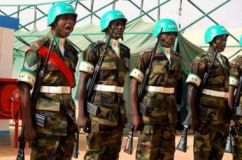UN’s Pronk urges beefing up African Union in Sudan
Sept 18, 2006 (UNITED NATIONS) — The United Nations should beef up African Union forces in Darfur with troops and logistical support, even if Sudan does not allow a full U.N. operation, a senior U.N. envoy said on Monday.
 Sudan is expected to ask the African Union to stay in Darfur past its mandate, which expires on September 30. But the AU is strapped for cash and equipment and has not been able to stop killings, plunder and widespread rape in the lawless western region.
Sudan is expected to ask the African Union to stay in Darfur past its mandate, which expires on September 30. But the AU is strapped for cash and equipment and has not been able to stop killings, plunder and widespread rape in the lawless western region.
Jan Pronk, the U.N. envoy for Sudan, told the Security Council and reporters afterwards that rather than only continue confrontations with Khartoum leaders, who have firmly rejected a U.N. force, the focus should be on the African Union’s force of 7,000.
“I think the government of Khartoum is quite willing to accept an African Union force, being led by the African Union with a lot of support from others,” Pronk told reporters after his briefing to the U.N. Security Council.
“I think that would also imply boots on the ground,” he said. “Try it. It is possible. But you have to talk. You have to negotiate.”
Sudan’s Vice President Ali Osman Mohamed Taha told a news conference in Khartoum that Sudan wanted the AU to be able to better implement a peace deal signed in Abuja, Nigeria, in May between the government and one rebel faction.
“We call for strengthening efforts of the African Union. We call for strengthening efforts aimed at implementing the Abuja agreement,” he said.
Pronk, however, told the council that the Darfur Peace Agreement was nearly dead and prompted more fighting. “It is in a coma. It ought to be under intensive care, but it isn’t.
He said a cease-fire commission, established under the pact, barely functioned, did not invite all rebel factions and prevented senior U.N. military and American officials from even speaking at the few meeting it managed to hold.
Meanwhile, Sudan’s President Omar Hassan Bashir is expected to address the African Union’s Peace and Security Council on Wednesday on the sidelines of the U.N. General Assembly session in New York, along with other African leaders.
President George W. Bush, under pressure from human rights groups and Congress, is expected to name Andrew Natsios, the former head of the U.S. Agency for International Development, has a special envoy for Darfur, according to U.S. officials and Senator Norm Coleman, who was visiting the United Nations.
MINISTERIAL MEETING ON DARFUR
The United States and Denmark are organizing a ministerial meeting late on Friday on the crisis in Darfur among the 15 Security Council members plus Canada, South Africa, Nigeria, Senegal, Rwanda, Netherlands, Chad, Norway, Egypt and Algeria, diplomats said.
The U.N. Security Council adopted a resolution on August 31, authorizing up to 22,500 police and troops for Darfur, once Sudan allows in the force. Otherwise troop contributors will not fight their way in.
Bashir has likened a U.N. presence to an invasion force bent on regime change in Khartoum, which diplomats said was based on an apprehension his regime would be toppled. Pronk said Khartoum should be given assurances to the contrary.
Secretary of State Condoleezza Rice on Monday strongly urged China to use its influence to persuade Sudan to allow a U.N. force to deploy. She made her appeal to Chinese Foreign Minister Li Zhaoxing in New York.
China, which supports the U.N. force and exports half of Sudan’s oil, has said it has spoken to Khartoum leaders. But diplomats said unless Beijing and neighboring Arab countries use their leverage, Bashir would not listen to the West.
Years of fighting in Sudan’s west have forced more than 2 million people to flee their homes for overcrowded refugee camps with little prospect of returning to the life they once knew. Non-Arab tribes took up arms against the government in February 2003 to protest alleged neglect and deprivation.
In turn Sudan, unleashed and armed Arab militia who murdered and raped civilians. In recent months, factions of rebel groups and bandits have done the same.
Lord Triesman, the British Foreign Office minister for Africa, told reporters at the United Nations that rebel groups were splitting into smaller factions, with “wholly unrealistic objectives.”
Both he and Pronk said he Khartoum government was also violating the Abuja accord by fielding soldiers in Khartoum and launching raids with helicopter gunships.
“We are beyond the point where we should be very concerned with saving face. We should be concerned with saving lives,” Triesman said.
(Reuters)
